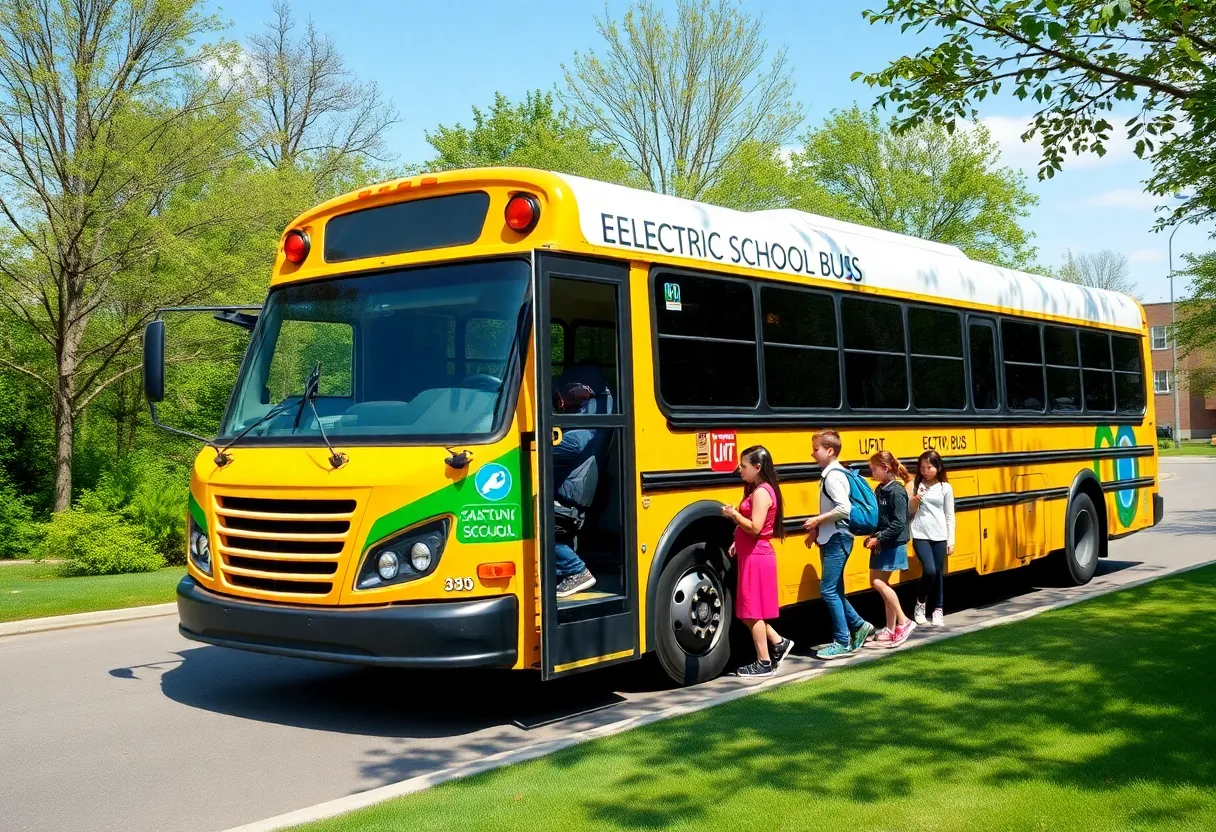News Summary
Virginia’s freshman Del. Holly Seibold has introduced a budget amendment seeking $200,000 to revitalize the state’s electric school bus initiative. This funding will aid school districts in transitioning from diesel to electric buses through the Clean Vehicle Grant Fund. Virginia ranks fourth nationwide in electric school bus numbers but lacks a dedicated state-funded program. Advocates stress the urgent need for sustainable funding solutions, especially as federal support diminishes by 2026, emphasizing the health benefits of reducing diesel pollution for students.
Virginia is taking steps towards revitalizing its electric school bus initiative, as freshman Del. Holly Seibold has proposed a budget amendment to allocate $200,000 to the Clean Vehicle Grant Fund, which has remained unfunded since its creation three years ago. The amendment seeks to transfer funds from the general fund to the Department of Environmental Quality (DEQ), distributing $100,000 for the fiscal year 2025 and another $100,000 for 2026.
The Clean Vehicle Grant Fund is designed to assist school districts in transitioning away from diesel-powered buses to electric models. Despite Virginia’s ranking as fourth in the nation for the number of electric school buses either on the road or ordered—totaling 302 out of over 16,000 school buses in service—it has lagged in establishing a dedicated state-funded program. The current initiative relies heavily on federal allocations and public-private partnerships for its funding.
Since 2022, 67 of Virginia’s electric buses have been funded through grants from the Environmental Protection Agency (EPA) as part of a nationwide initiative aimed at electrifying school bus fleets with a $5 billion federal allocation. However, this funding is expected to run out by 2026, leading advocates to stress the urgent need for sustainable state-level funding solutions.
Advocates for electric bus initiatives, including environmental advocate Bobby Monacella, have pointed out that the lack of a consistent funding stream could hinder school districts’ ability to switch to electric buses once federal support is no longer available. The health implications of reducing diesel pollution are particularly significant, especially for children who suffer from asthma, highlighting the necessity for cleaner transportation options.
Virginia attempted to push forward advanced electrification legislation in 2021, which had the backing of then-Del. Mark Keam. The proposed bill aimed to create a cleaner environment for students, but ultimately lost its funding source—a tax on dyed diesel fuel—leaving the initiative unsupported financially.
Seibold’s amendment not only calls for immediate funding but also aims to facilitate the establishment of a workgroup under the DEQ that would seek long-term state funding solutions for the transition to electric buses. Current funding approaches in Virginia have been fragmented, leading to different levels of electrification across various school districts, depending on available federal grants, private investments, and utility programs.
Monacella and Seibold collaborated on the budget amendment after engaging in discussions during a recent legislative Q&A session, underscoring the importance of timely action regarding funding support. Typically, the cost of electric school buses is significantly higher than that of traditional diesel buses, with a basic electric bus averaging approximately $368,500 compared to about $120,099 for a diesel model.
Fairfax County represents a significant player in Virginia’s electric bus landscape, currently operating 73 electric buses, which constitute nearly one-fourth of the state’s total electric bus count. Local environmental advocacy campaigns, including those led by Monacella, have prompted Fairfax County to commit to converting its entire bus fleet to electric by the year 2035.
Various advocates, including Tish Tablan of Generation 180, are emphasizing the critical need for a dedicated state funding source to facilitate the transition to electric buses. This mirrors initiatives in other states like California, Maryland, and New York, which have adopted comprehensive incentives and mandates for electrifying school buses.
The proposed budget amendment by Del. Seibold is currently under consideration, with increasing pressure on state legislators to advance it within the ongoing legislative session. Should this amendment pass, it may open the door to a more sustainable and health-conscious future for Virginia’s public school transportation system.
Deeper Dive: News & Info About This Topic
- West Virginia Metro News
- Wikipedia: Electric School Buses
- WOWK TV
- Google Search: electric school buses funding Virginia
- WCHS TV
- Google Scholar: electric school buses Virginia
- Electrive
- Encyclopedia Britannica: Electric Buses
- PR Newswire
- Google News: electric school buses Virginia

Author: STAFF HERE WILLIAMSBURG WRITER
The WILLIAMSBURG STAFF WRITER represents the experienced team at HEREWilliamsburg.com, your go-to source for actionable local news and information in Williamsburg, James City County, and beyond. Specializing in "news you can use," we cover essential topics like product reviews for personal and business needs, local business directories, politics, real estate trends, neighborhood insights, and state news affecting the area—with deep expertise drawn from years of dedicated reporting and strong community input, including local press releases and business updates. We deliver top reporting on high-value events such as Williamsburg Farmers Market, Yorktown Market Days, and Busch Gardens Food & Wine Festival. Our coverage extends to key organizations like the Greater Williamsburg Chamber of Commerce and Colonial Williamsburg Foundation, plus leading businesses in education and hospitality that power the local economy such as College of William & Mary, The Williamsburg Winery, and Sodexo. As part of the broader HERE network, including HEREVirginiaBeach.com, we provide comprehensive, credible insights into Virginia's dynamic landscape.


